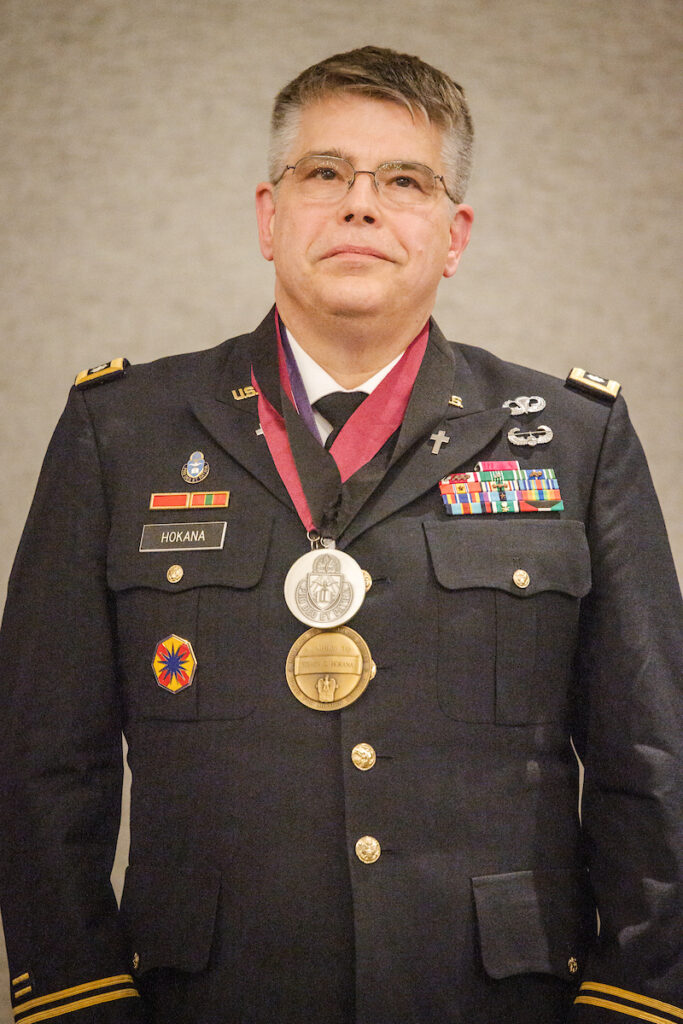Q&A
Q&A with Chaplain Steven Hokana
Hokana discusses Christ’s hope and help for those with PTSD.

Chaplain (Lt. Col.) Steven Hokana, assistant director of LCMS Ministry to the Armed Forces (MAF), receives an award at the MAF dinner during the 2019 Synod convention.
Chaplain (Lt. Col.) Steven Hokana, assistant director of LCMS Ministry to the Armed Forces, is a clinically trained hospital chaplain with a specialty in Post-Traumatic Stress Disorder (PTSD). He has written many articles, served on panels, led pastoral conferences and worked in trauma mitigation with children and adults. However, his experience with trauma is not purely academic. He served 26 years as an active-duty U.S. Army chaplain and saw combat during Operations Desert Storm and Desert Shield. He also served for years at multiple Army medical centers. He recently took a few minutes to discuss Christ’s hope and help for those with PTSD.
What led to your interest in the topics of PTSD and trauma mitigation?
A: When I entered into an Army-supported Doctor of Ministry program around 2002, knowledge of PTSD was in its infancy. I sat down with an LCMS four-star general, and he told me, “Post-Traumatic Stress Disorder, that’s an area that you really need to look at.” With veterans in my family, I had found that they want to share. But they have a lack of trust, because there have been those few moments when they’ve tried to open up, and it just didn’t go well.
How do you recognize when you are facing PTSD?
A: Post-Traumatic Stress Disorder is a medical condition, a diagnosed behavioral health condition. The symptoms are re-experiencing the trauma, difficulty talking about the trauma, depression, detachment, avoidance.
Where should someone who is struggling with PTSD go for help? Can they talk to their pastor?
A: If someone feels sincerely that they have PTSD, they need to talk to a certified, qualified behavioral health provider. But pastors offer things that the behavioral health community cannot. Scripture is so absolutely important, with its reminders that in the midst of tumultuousness, God is still God. The Sacraments are absolutely important. Baptism reminds us of who we are, the Lord’s Supper that we belong to the whole Christian church on earth. The prayers and liturgy tie us to the church [of all ages]. And the Department of Veterans Affairs, the Centers for Disease Control and Prevention, they can’t do any of that.
How might PTSD manifest itself in the midst of the COVID-19 pandemic?
A: The CDC has observed this pandemic exacerbating issues that people already have, such as depression. This is a time of isolation. There’s a price to pay for that.
How can people support those who are suffering during this time?
A: It’s important to build trust: If they want to talk to you, be available; if they aren’t able to talk, be understanding. If they start to get emotional, recognize that it’s not about you. They’re deeply hurt. Let them know that you love them, and that you’re there for them. Let them know that they’re loved because they are a child of God in Christ, even if they don’t feel it. And pray for these people. If you say you’re going to pray for them, do.
Anything else you’d like to add?
A: There can be growth and healing after trauma. God, in His grace and mercy, journeys with us. Yes, we’ve gone through terrible things. But it’s a great, wonderful, beautiful world, and God has sent us His Son, Jesus, to redeem us. You can come back from even the worst trauma.
Learn More
- Read more about LCMS Ministry to the Armed Forces.
- Watch a presentation from Hokana on caring for pastors during the COVID-19 pandemic.
Stacey Eising
Managing editor for The Lutheran Witness.

